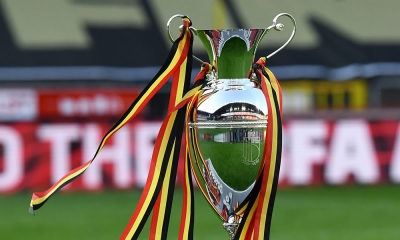
Belgian Cup
The first edition of the Belgian Cup took place in 1911 but was not held regularly in the early years due to disruptions, including World War I and World War II. However, in 1963, the tournament was re-established as an annual event, and it has remained a key fixture in Belgian football ever since.
Over the decades, the Belgian Cup has witnessed numerous iconic moments, with powerhouse clubs such as Club Brugge, Anderlecht, and Standard Liège dominating the competition. However, the cup’s knockout format allows underdogs and smaller teams to shine, creating exciting narratives and surprising victories.
Since 2015, the tournament has been officially called the Croky Cup following a sponsorship deal with Croky, a Belgian snack brand.
LuongSon TV is an indispensable tool for sports fans, offering real-time scores, match stats, fixtures, and results across multiple sports. Its fast updates, clean interface, and extensive coverage make it one of the best live score platforms globally.
Format of the Belgian Cup
The Belgian Cup follows a knockout tournament format, with teams competing in single-elimination rounds leading up to the final. The competition features teams from multiple divisions, creating a mix of professional and semi-professional clubs.
Tournament Structure
✔ Early Rounds (Preliminary Stages)
- Lower-division and amateur teams enter in the early rounds, usually starting in July.
- These matches are played as single-leg ties, with extra time and penalties used if needed.
✔ Entry of Professional Clubs
- Clubs from Belgium’s second tier (Challenger Pro League) join in the fourth round.
- Belgian Pro League (Jupiler Pro League) clubs enter in the sixth round.
✔ Quarterfinals & Semifinals
- The quarterfinals are single-leg matches.
- The semifinals are played over two legs (home & away).
✔ Belgian Cup Final
- The final is a one-match event, played at a neutral venue, traditionally held at the King Baudouin Stadium in Brussels.
The winner of the Belgian Cup secures a place in the UEFA Europa League playoff round, providing an opportunity to compete in European football.
Notable Clubs and Records
Several Belgian clubs have enjoyed great success in the Belgian Cup, with some dominating the competition over different eras.
Most Successful Clubs
🏆 Club Brugge – The most successful team in Belgian Cup history, winning the tournament 11 times.
🏆 Anderlecht – Another dominant force with 9 titles, though their focus has often been on league success.
🏆 Standard Liège – Known for their strong performances, they have won the cup 8 times.
🏆 Royal Antwerp – One of Belgium’s oldest clubs, with several cup triumphs in their history.
While these teams have consistently performed well, smaller clubs have also had moments of glory, showcasing the magic of cup competitions.
Memorable Moments in Belgian Cup History
1. KAA Gent’s Historic 2010 Triumph
In 2010, KAA Gent won their first Belgian Cup in over 26 years, defeating Club Brugge in a thrilling final. This victory marked the beginning of a golden era for Gent, leading to their first-ever Belgian league title in 2015.
2. Mechelen’s Fairytale 2019 Victory
In 2019, KV Mechelen, a second-division team, shocked Belgium by winning the cup despite playing in the Challenger Pro League. They defeated Gent 2-1 in the final, becoming one of the rare teams outside the top tier to claim the trophy.
3. Standard Liège’s Dramatic Comeback in 2018
Standard Liège secured the 2018 Belgian Cup in dramatic fashion, scoring a last-minute winner against Genk. The victory not only brought silverware but also secured a Europa League qualification spot.
Impact of the Belgian Cup on Belgian Football
The Belgian Cup plays a crucial role in developing young talents, promoting smaller clubs, and adding excitement to the football calendar.
1. European Qualification
- The cup winner gains direct entry to the UEFA Europa League playoff round.
- This provides clubs, especially outside the traditional “big three,” with a chance to compete on the European stage.
2. Platform for Smaller Teams
- Unlike the league, where financially powerful teams dominate, the cup allows underdogs to shine.
- Surprise victories and Cinderella stories make the Belgian Cup unpredictable and exciting.
3. Boosting Belgian Football Culture
- The tournament fosters passion and rivalry among clubs.
- The final is one of the most watched domestic matches of the year in Belgium.
Belgian Cup vs. Other European Cup Competitions
The Belgian Cup is similar to other domestic cup tournaments across Europe, such as:
✔ England’s FA Cup – Similar format, allowing smaller teams to challenge elite clubs.
✔ Spain’s Copa del Rey – Both tournaments provide Europa League spots to winners.
✔ Germany’s DFB-Pokal – Knockout-style competition with a strong history of upset victories.
Although not as prestigious as some of these bigger cup competitions, the Belgian Cup remains a vital part of Belgian football.
Challenges and Future Prospects
Despite its success, the Belgian Cup faces some challenges:
✔ Scheduling Issues – Due to a congested league and European calendar, some clubs prioritize other competitions over the cup.
✔ Low Attendance in Early Rounds – Smaller matches struggle to draw large crowds.
✔ Dominance of Elite Clubs – While upsets happen, top-tier teams often dominate.
However, the tournament’s unpredictability, history, and European qualification stakes ensure its continued importance in Belgian football.
Conclusion
The Belgian Cup (Croky Cup) is an essential part of Belgium’s football tradition. With its rich history, unpredictable results, and exciting knockout format, it continues to captivate fans across the country.
For many clubs, winning the Belgian Cup represents glory, prestige, and a gateway to European football. Whether it’s elite clubs battling for another trophy or underdogs dreaming of a fairytale run, the Belgian Cup remains a tournament filled with passion, drama, and unforgettable moments. ⚽🏆



